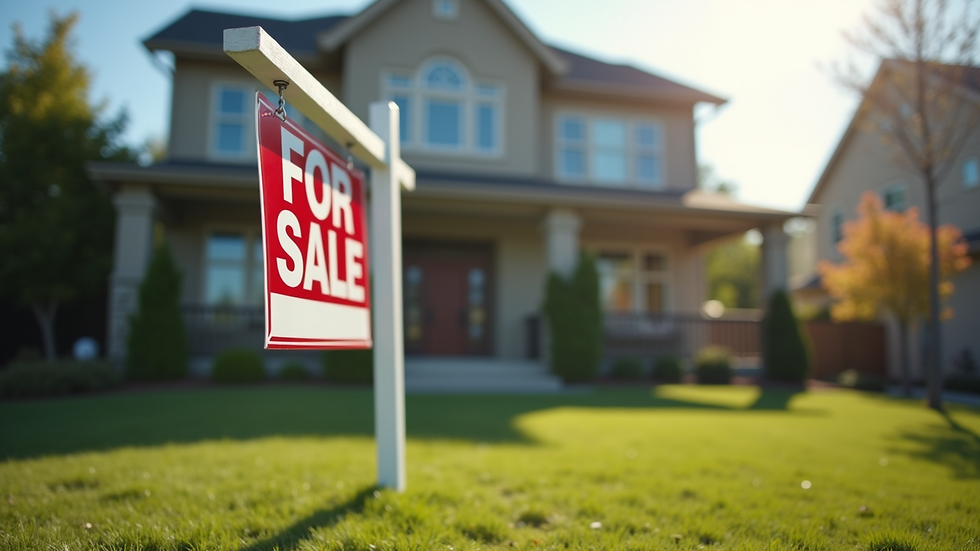A Clear and Simple Guide to Buying Your First Home
- Petrice Hogue
- Oct 20, 2025
- 3 min read
Buying your first home is an exciting milestone, but it can also feel overwhelming. There are many steps to take, decisions to make, and terms to understand. This guide breaks down the home buying process into clear, manageable parts. Whether you’re just starting to think about buying or are ready to make an offer, this post will help you feel confident and prepared.
Understanding the Home Buying Process
Before diving into house hunting, it’s important to understand the overall home buying process. This will help you know what to expect and avoid surprises along the way. The process typically starts with assessing your finances and ends with moving into your new home.
Here are some key points to keep in mind:
Budgeting: Know how much you can afford by reviewing your income, debts, and savings.
Mortgage Pre-Approval: Getting pre-approved shows sellers you’re a serious buyer and helps you understand your loan options.
House Hunting: Look for homes that meet your needs and fit your budget.
Making an Offer: Once you find a home, you’ll submit an offer to the seller.
Home Inspection: A professional inspection ensures the home is in good condition.
Closing: Finalize the paperwork, pay closing costs, and get the keys to your new home.
Each step requires attention and sometimes professional help, but breaking it down makes it easier to manage.

How to Prepare Financially for Buying a Home
Financial preparation is one of the most important parts of buying a home. Here’s how to get ready:
Check Your Credit Score: A higher credit score can get you better mortgage rates.
Save for a Down Payment: Most lenders require 3% to 20% of the home price upfront.
Budget for Additional Costs: Include closing costs, moving expenses, and home maintenance.
Get Pre-Approved for a Mortgage: This gives you a clear idea of your price range and strengthens your offer.
For example, if you’re looking at homes priced around $300,000, a 10% down payment means you’ll need $30,000 saved. Don’t forget to add about 2% to 5% of the home price for closing costs.

What are the 7 Steps to Buying a House?
Knowing the specific steps can make the process less intimidating. Here are the seven essential steps to buying a house:
Determine Your Budget: Understand what you can afford.
Get Mortgage Pre-Approval: Secure financing before house hunting.
Find a Real Estate Agent: A professional can guide you through the market.
Start House Hunting: Visit homes and compare options.
Make an Offer: Negotiate price and terms with the seller.
Conduct a Home Inspection: Identify any issues before finalizing.
Close the Sale: Sign documents, pay fees, and get your keys.
Each step builds on the previous one, so take your time and ask questions if you’re unsure.
Tips for Choosing the Right Home
Finding the right home is about more than just price. Consider these factors:
Location: Think about commute times, schools, and neighborhood safety.
Size and Layout: Make sure the home fits your lifestyle and future plans.
Condition: Older homes may need repairs, while new builds might offer modern features.
Resale Value: Even if you plan to stay long-term, consider how easy it will be to sell later.
Visit multiple homes and take notes. Don’t rush your decision—finding a home that feels right is worth the effort.

Navigating the Closing Process
The closing process is the final step before you officially own your home. Here’s what to expect:
Review Closing Disclosure: This document outlines your loan terms and closing costs.
Final Walk-Through: Check the home to ensure it’s in the agreed condition.
Sign Documents: You’ll sign mortgage papers and legal documents.
Pay Closing Costs: These can include loan fees, taxes, and insurance.
Get the Keys: Once everything is signed and paid, the home is yours!
It’s normal to feel nervous, but your real estate agent and lender will guide you through this stage.
For a detailed breakdown of the steps in the home buying process, visit this helpful resource.
Moving Forward with Confidence
Buying your first home is a big step, but with the right information and preparation, it can be a smooth and rewarding experience. Remember to:
Stay organized and keep track of important documents.
Communicate openly with your real estate agent and lender.
Take your time to make informed decisions.
Owning a home is not just about the property—it’s about creating a space where you can build memories and feel secure. Use this guide as a starting point, and soon you’ll be turning the key to your new front door.




Comments